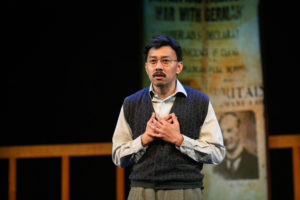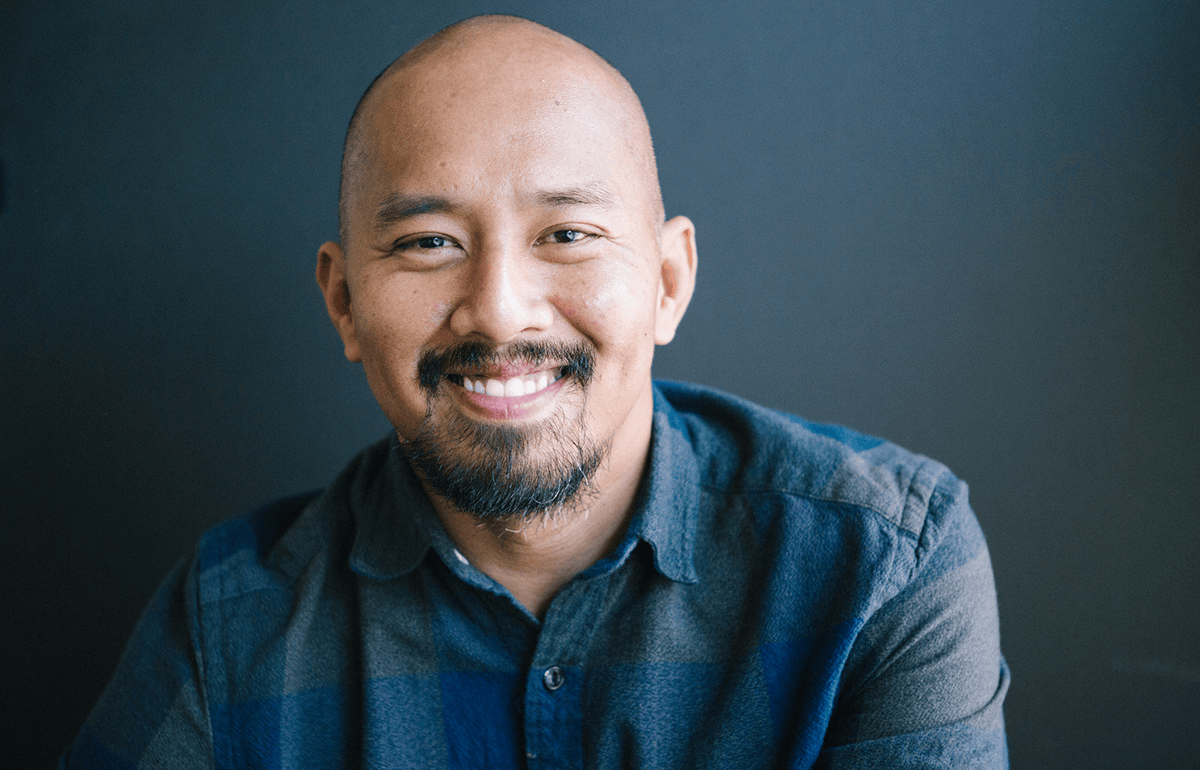This is part of a season preview package.
While the shift to working from home during the pandemic may have meant less time on the road for many, Jomar Tagatac can’t relate: He spent much of the past summer driving between his home in San Francisco and Sacramento, where he’s starring in the one-man co-production of Jeanne Sakata’s Hold These Truths at both the San Francisco Playhouse and Capital Stage. And while this history play marks the return for many in-person audiences in Northern California, and Tagatac’s first gig in such a setting, he also filmed a version for digital patrons, performing alone in an empty theatre. He’s been relatively busy in the supposed downtime, in other words.
Not that it was business as usual, he said in a recent interview.
“As actors, we’re so used to being able to have the audience respond, and you can sort of gauge the storytelling and see what the audience is attaching to,” he said of the filming experience. Playing only to three cameramen shifted his perspective on the story and how he delivered it. “It had that element of: storytelling is first, is first, is first.”
Sakata’s play, originally produced in 2007, follows the life of Gordon Hirabayashi, a university student and pacifist who opposed the internment of Japanese Americans during the early 1940s—a stance that took him all the way to the Supreme Court and resulted in his eventual imprisonment. Tagatac was familiar with the play before this summer, but still asked director Jeffrey Lo the guiding question of all artistic endeavors: Why this play now?
“There was this trend of violence against Asian Americans happening all around, even here in the Bay,” Tagatac told me. “This play is sort of responding to that.” They considered that their audience might include people who have spent the pandemic protesting and organizing, showing up for justice in their communities, homes, and workplaces. “We imagine we tell this story to folks who are fighting for freedom, who are fighting for equality. We tell this story about Gordon, who was fighting for the same and waited 40 years to get the justice he deserved.”
In a time when many Americans have been noting failures and breakdowns in systems they may have previously trusted—healthcare, education, policing—Tagatac’s portrayal of one man’s despair at a catastrophic failure of the American government to live up to its supposed ideals went deeper into his bones.

While COVID’s Delta variant poses questions across the country for all spheres of life, not least live performance, Tagatac has been pleased to see theatregoers returning, both in San Francisco and Sacramento. The assurance that patrons and company members are all vaccinated assuages some concerns and allows him to focus on the performance. Despite working as a fitness instructor, Tagatac said he found the experience of readjusting to performance leaving him frequently breathless.
“For the first couple weeks of rehearsals, we’d run through the piece and I’d be out of breath, because it was like, ‘I’ve been talking for an hour and a half already!,’” he said. “It took a couple reps for me to build up the endurance to do the piece, and to do it with the kind of buoyancy and lightness it needs.” (After describing this physical phenomenon, he then asked me, tongue-in-cheek, “Am I talking too much?”)
Our conversation ranged from the best place to stop en route from San Francisco to Sacramento (the Le Creuset outlet store, he said, all the better to ponder the things you may have learned to bake in lockdown) to working out again after an injury (do not make “ropes and rowers” your first class back) to vaccination rates across the country. “Things are pretty up in the air,” Tagatac said of the state of theatre in the changing pandemic landscape.
Above all, he said, the pandemic forced him to remember that he can’t take any one role or production for granted. Living show-to-show was precarious even before we all had to pivot to digital theatre on the fly, and the mentality of taking every opportunity that comes your way—regardless of your time or your health—can be insidious.
“These jobs are hard to come by sometimes,” he said. “When a job comes your way, it’s like, ‘Yes! 100 times yes! Of course I’m going to do it!’” Living in a one-man production for so long has allowed Tagatac to reevaluate his relationship not only with his own body but with theatre itself. His mantra and top priority now: “Making sure you make the most of each and every single day that you’re inside a theatre, even if it’s Zoom.”
If all goes according to plan, Tagatac will be onstage for in-person audiences again in Charles L. Mee’s Wintertime at Berkeley Repertory Theatre in November. Though he’s spent much of his life in the Bay Area and capital region after emigrating from the Philippines as a child, the show will mark his first at Berkeley Rep.
“I’m so, so hopeful,” he said of the theatre industry, the COVID situation in the Bay Area, and the future outlook in general. But, he added with a boisterous laugh, “What this year has taught us is anything can happen.” Whether that means he’s on a stage, a screen, or in front of a class of eager rowers, Tagatac is ready to take it all in stride.
Amelia Merrill (she/her) is an editorial contributor for American Theatre. @ameliamerr_


